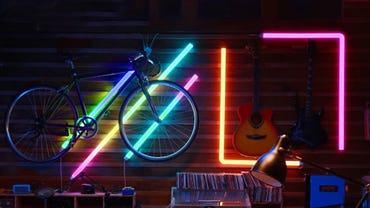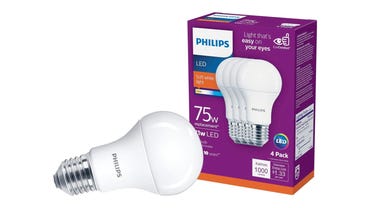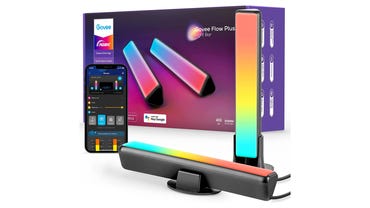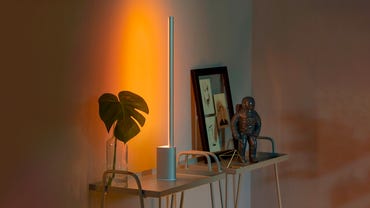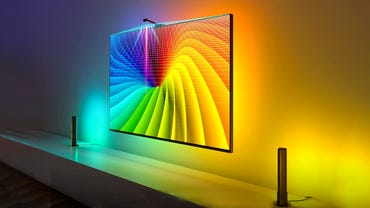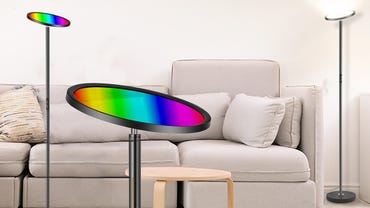Hue and Govee: Take smart lighting to the next level | ZDNet
Right around 2014, we had two blessed events in the Household Gewirtz. A bouncy baby named Alexa came into our lives as did a gaggle of Hue bulbs. Little did we know Alexa would grow up to become the robot overlord who kills us in our sleep…actually, that’s a story for a different article. But we did bring Amazon’s Alexa into our home, along with Philips Hue bulbs. Over the course of the next few years, we replaced all our inconvenient lighting with Alexa-controlled Hue lights.
As time went on, we moved into a new home and the smart lighting world continued to innovate. Hue and other early smart bulbs required hubs. Later, vendors like Govee introduced smart lights that connect to your Wi-Fi router. Now, Hue offers a mix of Wi-Fi, Bluetooth, and hub support, with more advanced features reserved for the hub.
But our secret has been to ignore most apps and rely almost entirely on Alexa for smart home control. The exception to that has been the gorgeous color animations that Govee downloads to some of its lights. The Govee approach works with Alexa. We program a lighting effect once, and then, whenever Alexa or an Alexa routine turns on that light, the effect runs automatically.
Today, our home is a mix of Hue bulbs, Govee lights, and a few outliers, like the uplights I mention at the end of this article. Without a doubt, automated lighting is a fixture in my home. And after you see some of these great choices by Govee and Hue, it may be in yours as well.
One note, though: Most smart lights seem to like the 2.4Ghz band. You may need to do some serious fiddling with your router to get them to work. But it’s worth it.
Hue-flexible ambient light without wires
Hue’s newer lights no longer require the Hue hub, and this is one of those lights. With the hub, you get automation and smart home scheduling (although Alexa can do that, too, without the hub). We really like this product because it doesn’t require a wall outlet. Instead, you charge it up, and you get about 10 hours (in our testing) of white or colored light.
This is great for an atmospheric corner, although the recharging might be a pain. Where I think this will get a lot of use is with photographers, YouTubers, and videographers who want to create a spot of light or a mood in their videos. Just plant it where you want the light, and the mood will follow.
Customizable wall accent lights
We’ve seen a lot of smart wall accent lights over the years. What makes this one cool (beyond Govee’s knock-it-out-of-the-park light animations) is that you can arrange these lights like straws on the wall. On kit will get you eight straight pieces and four corners, which you can arrange however you like.
You can get quite far with one kit, but the Govee app allows you to link together more than one kit, so you can create entire walls of light wild enough to rival your local club. Use them at home, in a meeting room, in a lobby, or as accents in a retail establishment. No matter how you arrange them, they are very cool.
The classic Hue bulb, with a bit more oomph
Smart lighting has come a long way in the past few years. I bought the first Hue bulb, the classic A19, used 9 watts and put out the rough equivalent of a 60W incandescent bulb. These E26 bulbs use a tad more juice at 11W and put out the lighting equivalent of a 75W incandescent bulb.
But it’s the price that’s the big change. I spent $60 each on my first Hue bulbs back in 2014. This kit gets you four bulbs for $21.99 or less than $6 each. You can now get ten bulbs for what I paid for a single bulb. Of course, since 2014, I’ve populated my house with Hue bulbs. They’re in almost every room and made a huge difference in the quality of life. My only wish: that there were 150W and 200W equivalent bulbs for a brighter presentation.
Hey, Philips, get to work on that, please!
Mood lights that can hear your tunes
This is another cool offering by Govee. These are small, free-standing light bars you can put next to your monitor, your stereo, or a smaller TV. They’ll also work near larger TVs, but they just aren’t as tall as some big TVs. They can run light field animations from Govee’s app.
What sets these lights out is their internal microphone. They can listen to the sound in your room and pulse and dynamically change based on those sounds. There have long been apps that tie to Hue lights to do this, but Govee’s solution doesn’t require the app to be open or your phone to be listening (or even on).
Mini light stick with color changing effects
I really like this light, which is why I include it. But I’m not sure you’ll be able to get your hands on one. Basically, it’s like a shorter version of the Govee Lyra I reviewed last year. The Lyra is tall enough that it lives on the floor. The Hue Signe looks almost identical but is sized for a table. Govee does have a table light, but it’s not nearly as sleek as either the Hue Signe or the Lyra.
But here’s the challenge. While the Signe is very nice, the review unit I got from Hue arrived beat to crap. This may be a common problem because the only units you can get on Amazon are from the Amazon Warehouse and third-party sellers. Hue’s site itself shows them as out of stock. That said, I’m including the Signe in this list because it really is a great light — if you can find it.
Your TV experience…intensified
Govee sent me two different Immersion kits, and while they both get the job done, I definitely found the more expensive unit worked better for me. The standard Immersion kit consists of a stick-on LED strip and a camera you mount on top of your TV. The camera watches the TV and captures the color ambience. It sends that data to the light strip, providing an immersive backlight experience for your TV. It’s definitely cool.
The more expensive version ($89 instead of $129) includes two free-standing Flow-style lights that allow you to direct more light away from your TV. In my case, I have a rather large TV (don’t judge me, I need my science fiction!), and the larger kit does provide better immersion. Either way, the Immersion products up the TV watching experience to a surprising level.
Super-bright torchiere lamps
Our living room has been sporting the brightest Hue bulbs we could find, which were great for mood but terrible if we wanted to read or do any work. My wife and I needed more light, and we reached the point where we actually considered putting a bunch of Hue bulbs together in a cluster.
We did a lot of research and finally found lights that seemed to work. We bought one, tested it, compared the light level from these to our Hues, and confirmed that a Hue bulb at 100% matched one of these lights at 20%.
We bought four. Well, not exactly. The lamps we bought are branded Adecorty and are no longer available on Amazon. Instead, I’m linking to lamps branded by HueLiv (see what they did to that trademark?). These are exactly the same specs and use the same promotional pictures and writing as the ones we bought, so hopefully, they’re just as good.
Frequently asked questions
Here are a few questions I’m pretty sure some of you will ask.
Do these require a separate hub?
Older Hue products definitely do. Newer Hue products have kind of a mix-and-match approach with hubs and Bluetooth. The Govee products simply use Wi-Fi, but be aware you’ll need to provide 2.4Ghz Wi-Fi.
How many smart lights can you use?
I used to think the max was 32, but I’m well north of 40 already. So, a lot.
What’s the color quality?
So, yeah. We use color mainly as a novelty. Most of our lights are just a nice warm white. It is good to be able to change colors, but other than holidays or just for kicks, the main lights just stay white. The accent lights definitely have colors. Reds, oranges, and purples work well. The blue on the Govee Lyra is fantastic. Greens tend to be hit or miss. I’ve found the Govee color quality to be more intense than the Hue colors generally, but I haven’t subjected them to any metered testing.
Our process
Usually, it begins with sitting on the couch, at my desk, or in bed and deciding that I really don’t want to move to change a light. Sometimes, it’s because I left a light on, and my wife wants me to turn it off — but it’s not a smart light. In general, we’ve added smart lights wherever we’ve seen a need or found an inconvenience.
We bought most of our lights with our own money, but recently Govee and Philips both sent me some products to test. I probably wouldn’t have bought the fancy accent lights on my own, but getting to see them has shown me just how cool they are. I’m definitely down with augmenting the TV lights and may look at using some of the speciality lights with my studio when I film videos.
As for the rest of the process, it’s mostly been trial and error. We tinker a lot with our environment, especially since we work from home. Don’t be afraid to try something. Oh, and using them with Alexa gets past the Tower of Babel that is all those vendor-specific apps. You can probably do the same with Google Assistant and Home Pods, but I haven’t tried it.
So what about you? What’s your smart home setup like? Let us know in the comments below.
You can follow my day-to-day project updates on social media. Be sure to follow me on Twitter at @DavidGewirtz, on Facebook at Facebook.com/DavidGewirtz, on Instagram at Instagram.com/DavidGewirtz, and on YouTube at YouTube.com/DavidGewirtzTV.
For all the latest Technology News Click Here
For the latest news and updates, follow us on Google News.

